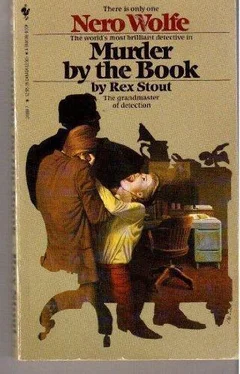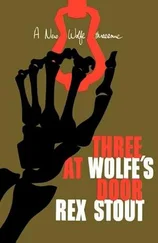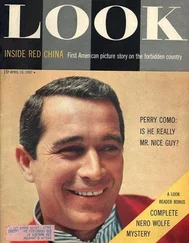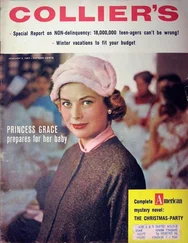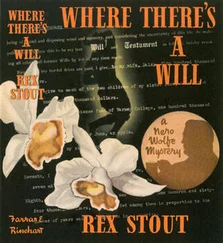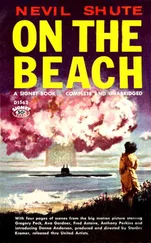Rex Stout - Murder by the Book
Здесь есть возможность читать онлайн «Rex Stout - Murder by the Book» весь текст электронной книги совершенно бесплатно (целиком полную версию без сокращений). В некоторых случаях можно слушать аудио, скачать через торрент в формате fb2 и присутствует краткое содержание. Жанр: Старинная литература, en-GB. Описание произведения, (предисловие) а так же отзывы посетителей доступны на портале библиотеки ЛибКат.
- Название:Murder by the Book
- Автор:
- Жанр:
- Год:неизвестен
- ISBN:нет данных
- Рейтинг книги:5 / 5. Голосов: 1
-
Избранное:Добавить в избранное
- Отзывы:
-
Ваша оценка:
- 100
- 1
- 2
- 3
- 4
- 5
Murder by the Book: краткое содержание, описание и аннотация
Предлагаем к чтению аннотацию, описание, краткое содержание или предисловие (зависит от того, что написал сам автор книги «Murder by the Book»). Если вы не нашли необходимую информацию о книге — напишите в комментариях, мы постараемся отыскать её.
Murder by the Book — читать онлайн бесплатно полную книгу (весь текст) целиком
Ниже представлен текст книги, разбитый по страницам. Система сохранения места последней прочитанной страницы, позволяет с удобством читать онлайн бесплатно книгу «Murder by the Book», без необходимости каждый раз заново искать на чём Вы остановились. Поставьте закладку, и сможете в любой момент перейти на страницу, на которой закончили чтение.
Интервал:
Закладка:
The novel was substantially an account of the activities and relationships of our firm. The names were different and most of the scenes and circumstances were invented, but it was unmistakably our firm. It was so badly written that I suppose it would have bored a casual reader, but it did not bore me. It told of O'Malley's bribery of a juror (I use our names instead of those Dykes used) and of my learning of it and sending an anonymous letter to the court, and of O'Malley's disbarment. He had invented an ending. In the novel O'Malley took to drink and died in the alcoholic ward at Bellevue, and I went to see him on his deathbed, and he pointed at me and screamed, "Put not your trust!" In one way the novel was ludicrous. Its ending assumed that O'Malley knew I had
informed on him, but there was no adequate explanation of how he had found out.
I took the manuscript home with me. If I had found it by accident and read it, someone else might, and I couldn't risk it. After I got home I realized that I would be unable to sleep, and I went out again and took a taxi to Sullivan Street, where Dykes lived. I got him out of bed and told him I had found the manuscript and read it. In my agitation I did something incredible too. I took it for granted that he knew I had informed on O'Malley and asked how he had found out. I should have assumed that he had invented that.
But it didn't matter. He really had found out. I had not written the informing letter to the court on my typewriter here at my apartment, on which I am writing this. I had taken the precaution of writing it on a machine at the Travelers Club. There wasn't more than one chance in a billion of any risk in that, but that one had been enough. In connection with our defense of O'Malley on the bribery charge, we had photostats of all the exhibits, including the anonymous letter to the court., Dykes had made himself a fairly good expert on documents, and as a matter, of routine he inspected the photostat of the anonymous letter. He noticed that the "t" was out of line, crowding the letter to its right, and slanted a little, and he remembered that he had observed the same defect in some other document. And he found it. He found it in a typed memorandum to him which I had typed two months previously on that same machine at the Travelers Club. I had forgotten about it, and even if I had remembered it I would probably have considered the risk negligible. But with that hint to start him, Dykes had compared the photostat with the memorandum under a glass and established that the two had been typed on the same machine. Of course that was- not conclusive proof that I had typed and sent the letter to the court, but it convinced Dykes.
It bowled him over that I had found and read the manuscript. He swore that he had had no intention or desire to expose me, and when I insisted that he must have told someone, possibly O'Malley himself, he swore that he hadn't, and I believed him. He had the carbon of the
manuscript there in his room. The original had heen returned to him by a firm of publishers, Scholl Hanna, to whom he had submitted it, and he had put it temporarily in his desk at the office, with the intention of putting it in the hands of a literary agent. The longhand manuscript, written by him in longhand, from which the typist had worked, was also there in his room. He turned both the carbon copy and the longhand script over to me, and I took them home when I went and destroyed them. I also destroyed the original of the typed script two days later, after I had reread it.
I felt that I was fairly safe from exposure. I had of course done nothing actionable, but if it became known that I had informed on my partner in an anonymous letter the effect on my career and reputation would have been disastrous. It was not so much anything O'Malley himself could or might do as the attitude of others, particularly two of my present partners and certain other associates. Actually I would have been a ruined man. But I felt fairly safe. If Dykes was telling the truth, and I believed he was, all copies of the manuscript had been destroyed. He gave me the most solemn assurances that he would never speak of the matter to anyone, but my chief reliance was in the fact that it was to his own self-interest to keep silent. His own future depended on the future welfare of the firm, and if he spoke the firm would certainly be disrupted.
I saw Dykes several times at his room in the evening, and on one of those occasions I did a foolish and thoughtless thing, though at the time it seemed of no consequence. No, that's wrong-this occasion was not at his room but at the office after hours. I had taken from the file the letter of resignation which he had written months previously, and it was on my desk. I asked him, for no special reason that I remember, if the title "Put Not Your Trust" was from Shakespeare, and he said no, that it was in the 3rd verse of the, 146th Psalm, and I scribbled it in a corner of his letter of resignation, "Ps 146-3."
The phone was ringing, but I finished the paragraph before I answered it. It was Louis Kustin. He didn't sound as if his eyes were looking sleepy. He wanted to speak to Wolfe, and I told him he wouldn't be available until eleven o'clock.
"I suppose he's available to you?" he asked curtly.
"Sure, I live here."
"My associates and I are conferring, and I am speaking on their behalf as well as my own. I'm at my office. Tell Wolfe I want to speak to him as soon as possible. Tell him that the suicide of our senior partner is an irreparable blow to us, and if it can be established that Wolfe willfully and maliciously drove him to it he will be held accountable. Tell him that?"
"It'll ruin the day for him."
"I hope to ruin all his days."
The connection went. I wanted to resume my reading but thought I'd better pass it on and buzzed the plant rooms on the house phone. Wolfe answered. I reported the conversation.
"Pfui," he said shortly and hung up. I went back to Cor-rigan.
I felt that I was fairly safe, though I was not completely easy. Toward the end of December I was shocked into a realization of my true position. Dykes came into rny office, during office hours, and asked for a raise in pay of 50 per cent. He said that he had expected to make a considerable sum from the sale of his novel, and now that he had surrendered that source of income he would have to have a substantial raise. I saw at once what I should have seen clearly before, that I would be at his mercy for years if not for life, and that his demands would be limited only by his desires. I was literally in a panic but concealed it successfully. I told him that I had to consider the problem of justifying so large a raise to my associates, and asked him to come to my apartment the following evening, Saturday, December 30, to discuss the matter.
By the time he arrived for the appointment I had decided that I would have to kill him. It proved to be an absurdly easy thing to do, as he did not suspect my intention and was not on guard. As he sat I went to his rear on some trivial excuse, picked up a heavy paperweight, and hit him on the head. He crumpled without a sound, and I hit him again. During the four hours that I waited for the deserted streets of late night, or early morning, I had to hit him three more times. During those hours I also went for my car and parked it directly in front. When the time came I got him downstairs and into the car
without being observed. I drove uptown to an unused East River pier in the Nineties and rolled the body into the water. I must have been less calm and cool than I thought I was, for I thought he was dead. Two days later, in the newspaper account of the recovery of the body, I learned that he had died of drowning, so when I rolled him in he was only stunned.
Читать дальшеИнтервал:
Закладка:
Похожие книги на «Murder by the Book»
Представляем Вашему вниманию похожие книги на «Murder by the Book» списком для выбора. Мы отобрали схожую по названию и смыслу литературу в надежде предоставить читателям больше вариантов отыскать новые, интересные, ещё непрочитанные произведения.
Обсуждение, отзывы о книге «Murder by the Book» и просто собственные мнения читателей. Оставьте ваши комментарии, напишите, что Вы думаете о произведении, его смысле или главных героях. Укажите что конкретно понравилось, а что нет, и почему Вы так считаете.
